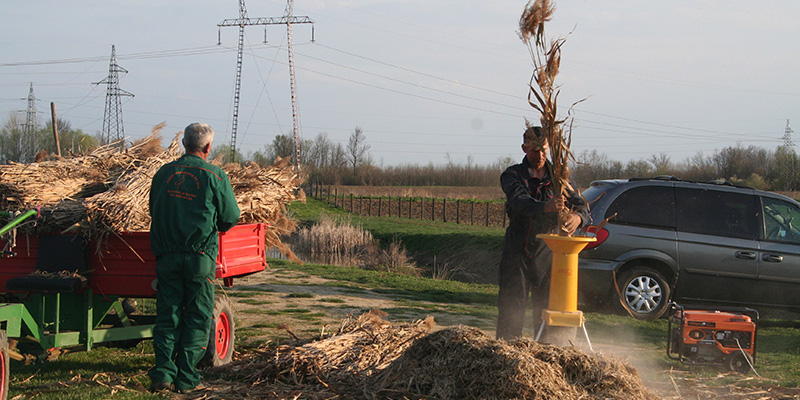
Reed grass is a monocotyledon, which overcomes by its fast growth each and every cultivated crop. Only due to constant mowing of reed grass is a possibility to control the conventional way this plant by conventionel methods (no use of chemicals). A large amount of green phytomass is remaining, which dries up with the time and forms a thick layer of dry mass. This dry matter is traditionally burned once per year, resulting in area-wide air pollution.
To avoid pollution, following consequently environmental sound, ecological appropriate and nature friendly agro business and with the background know-how of alternative energy recovery through biomass was the idea born to use reed as a bio-fuel component.
Traditional mowing and harvesting as well drying over a period of minimum 3 months provides the necessary base for reed pellets. Grinding and briquetting or pelleting provides the final product.
Latest tests and lab analyses showed, that the quality in regard to calorific value, ash content, moisture and natural components such as Clorine leads to quality class AI / II. In comparison to conventional fire wood such as willow shows the reed grass much higher quality.
What does Teko Inzenjering do:
- Production of reed briquettes
- Optimisation of mechanical equipment for briqetting or pelleting - - Handling of grinding and briquetting with our own machinery as service contract
In what amount can you get reed briquettes:
- In 25 kg bags or 50 kg bags
- Loose
Furhter forest related activities:
Beside the development of alternative and sustainable fuel production we are focusing on the development of energy forests. Currently an area of 1,5 ha are used to produce wood for energy recovery purposes. The forest is cultivated in a kind of tree plantage to achive optimal growth rates. As a principle on Stork´s Nest Farm are no chemicals against pests and diseases used, neither for fertilization. All fertilisation is carried out by phyto mechanism, such as growing glover for Nitrogen provision, phytomass (green mass) for organic supply and Tagettes for pestcontrol especially against nematodes.

from Read to Pellets - from Waste to Energy